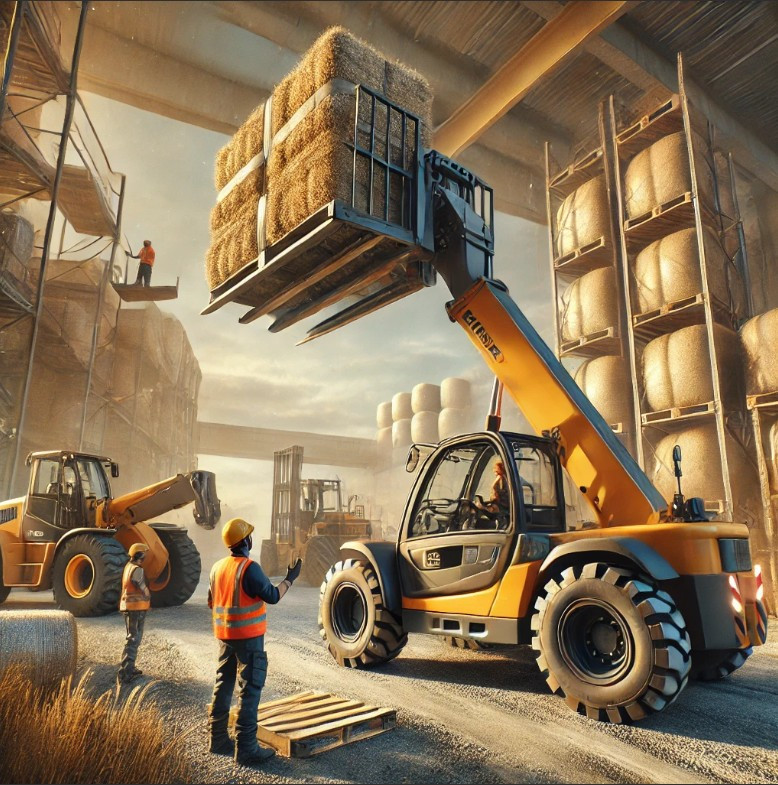Telehandlers are one of the most versatile pieces of heavy equipment in construction, agriculture, and industrial work. Often mistaken for oversized forklifts, telehandlers combine the lifting power of a forklift with the reach of a crane, making them essential for material handling, loading, and high-reach tasks. However, with great power comes great responsibility—and operating a telehandler without proper training can be dangerous.
At Get Drivers Ed, we provide comprehensive telehandler training to ensure operators understand safety protocols, equipment controls, and proper maneuvering techniques. If you’re looking to operate a telehandler, here’s why training is essential and how it can keep job sites safe and efficient.
What is a Telehandler?
1. Understanding the Role of a Telehandler
A telehandler, also known as a telescopic handler, is a machine designed to lift, move, and place materials at different heights. Unlike standard forklifts, telehandlers come with extendable booms that allow them to reach forward and upward—a feature that makes them indispensable on job sites.
How Telehandlers Differ from Forklifts:
🚜 Extendable Boom – Unlike forklifts, telehandlers have telescoping arms that provide more reach and flexibility.
🏗 Multi-Terrain Capabilities – Telehandlers are designed to work on uneven surfaces, making them ideal for outdoor construction.
🔄 Attachment Versatility – Unlike forklifts, telehandlers can be fitted with various attachments such as buckets, winches, and lifting hooks.
🛠 Higher Load Capacities – Telehandlers can lift heavier loads and position them at higher elevations.
At Get Drivers Ed, our telehandler training ensures operators understand the differences between forklifts and telehandlers so they can operate them safely and efficiently.
Why Proper Telehandler Training is Essential
2. Reducing Workplace Accidents
Operating a telehandler without training can lead to serious accidents, injuries, or even fatalities. Many workplace incidents involving telehandlers are caused by lack of proper handling knowledge, overloading, or improper positioning.
Common Telehandler Accidents Include:
❌ Overturning – If the boom is overextended without proper balance, the telehandler can tip over.
❌ Falling Loads – Improperly secured materials can fall, causing damage or injury.
❌ Collisions – Lack of awareness can lead to hitting structures, vehicles, or workers.
❌ Terrain-Related Incidents – Driving on uneven ground without proper stabilization can cause rollovers.
How Professional Training Helps Prevent Accidents:
✔ Teaches load capacity limits – Understanding how much weight a telehandler can handle prevents overloading and tipping.
✔ Covers proper boom operation – Operators learn how to extend and retract booms safely.
✔ Emphasizes stability control – Knowing how to position stabilizers and adjust for terrain is crucial.
✔ Provides hands-on experience – Practical training ensures operators build confidence in handling the machine safely.
At Get Drivers Ed, we focus on accident prevention techniques to ensure that telehandler operators know how to manage risks and work safely.
3. Increasing Job Site Efficiency
A trained telehandler operator not only enhances safety but also improves productivity and efficiency on job sites. Skilled operators can complete tasks faster, reducing downtime and increasing workflow efficiency.
Benefits of Professional Telehandler Training:
🔧 Faster Load Handling – Operators who know how to position and move loads correctly complete tasks more efficiently.
🔍 Improved Equipment Longevity – Proper handling reduces wear and tear on the machine, minimizing repairs and maintenance costs.
📊 Enhanced Coordination with Other Workers – Trained operators understand how to communicate effectively with ground crews.
🛑 Fewer Mistakes and Delays – Avoiding common operator errors keeps projects running on schedule.
At Get Drivers Ed, we ensure operators receive hands-on training to help maximize their efficiency on the job.
Key Skills You’ll Learn in Telehandler Training
4. Mastering Telehandler Operation
Proper training covers all aspects of telehandler operation, from basic controls to advanced maneuvering techniques.
What You’ll Learn in a Telehandler Training Course:
✔ Understanding Load Charts – Learn how to calculate safe load capacities based on boom extension and weight distribution.
✔ Safe Driving Practices – Master techniques for operating on different terrains, slopes, and inclines.
✔ Boom Control and Positioning – Understand how to safely extend and retract the boom while maintaining stability.
✔ Pre-Operational Inspections – Learn how to check hydraulic systems, tires, brakes, and stabilizers before use.
✔ Emergency Procedures – Know what to do in case of mechanical failures or hazardous situations.
At Get Drivers Ed, our telehandler training program provides a step-by-step approach to mastering equipment operation.
Why Employers Require Telehandler Certification
5. Meeting OSHA and Industry Regulations
In most industries, telehandler operators are required by law to complete proper training before using the equipment. The Occupational Safety and Health Administration (OSHA) enforces strict safety regulations to reduce workplace accidents.
Why Certification Matters:
📜 Ensures OSHA Compliance – Avoid fines and penalties by meeting industry safety standards.
🏗 Reduces Employer Liability – Properly trained employees lower the risk of workplace injuries.
🎯 Increases Job Opportunities – Certified operators are more attractive to employers in construction, warehousing, and logistics.
⚙ Improves Workplace Safety Culture – Having trained operators sets a high safety standard for the entire team.
At Get Drivers Ed, we provide OSHA-compliant telehandler training, ensuring operators meet all legal and workplace requirements.
Conclusion: Get Certified and Operate Telehandlers Safely
Telehandlers are powerful machines that require specialized training to operate safely and efficiently. While they may look similar to forklifts, their extended reach and lifting capabilities make them more complex to handle. Without proper training, operators risk accidents, costly damages, and legal penalties.
At Get Drivers Ed, we offer comprehensive telehandler certification courses that teach safe operation, load management, and OSHA compliance.
Take the first step toward safe and skilled telehandler operation! Enroll in our telehandler training course today and gain the knowledge and confidence to handle equipment safely and efficiently.


